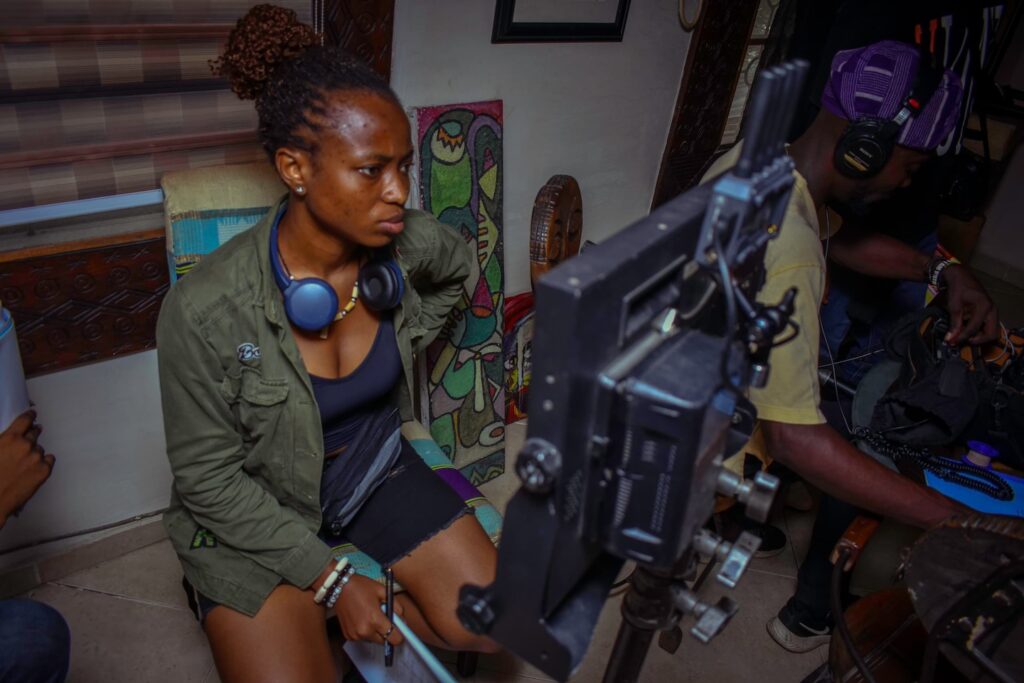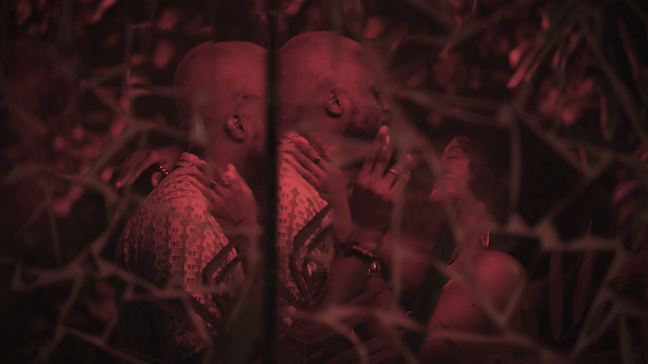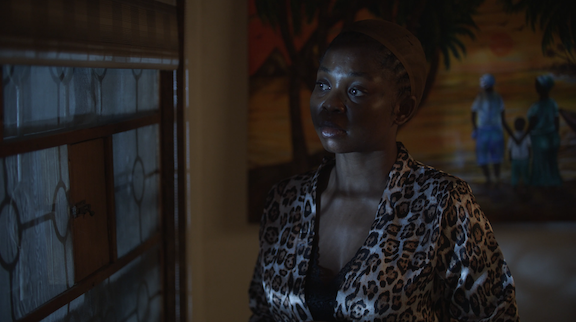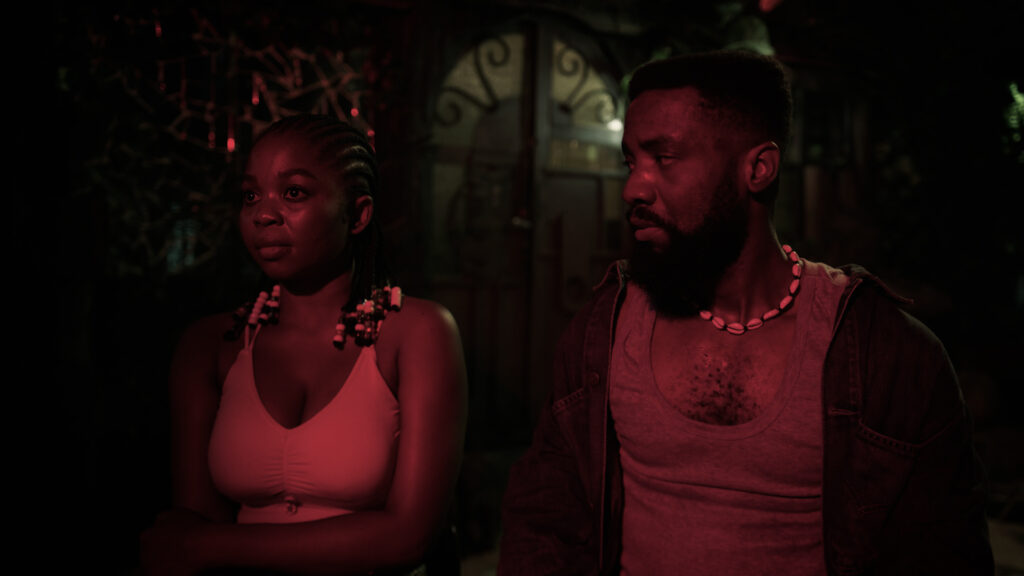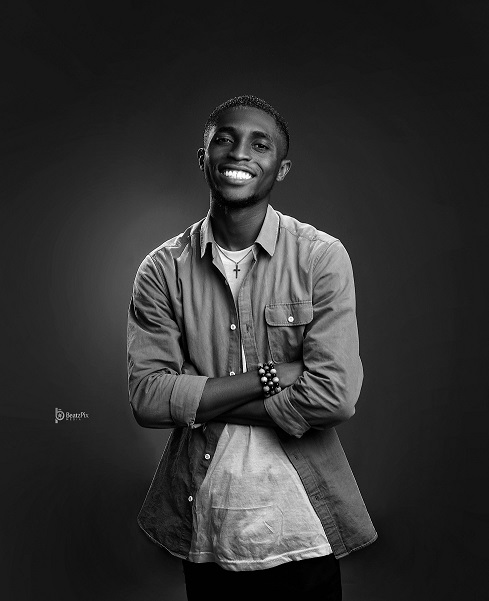Nneoha Ann Aligwe used to peek into the living room while the adults in her family watched films, because her parents believed that movies without moral lessons could distract kids or undermine their intelligence, and yet when she turned 13, she wrote in her diary: When I grow up, I’ll make films.
She had a Law degree from Ebonyi State University and was working at a Lagos law firm for her National Youth Service when she developed “a deeper yearning to create something meaningful.” It was 2019 and she, like many new graduates, was broke. The financial constraint drove her to think creatively. She put her entire NYSC allowance into a short film she wrote: with one character, no dialogue, and a single setting. She called it Facebook Friend and submitted it to festivals. It became a semi-finalist for the 2020 #IAMAfrica Short Film Competition. That year, she read the touching story of Grace Ohkime, a woman who suffered discrimination due to her neurofibromatosis, and reached out to her. The result was a documentary, Born Different.
After completing her NYSC, Aligwe started an internship at a film studio in Abuja, working as a screenwriter, camera operator, and editor for a year. She became Creative Director at Smyle Radio TV, working on film projects and directing documentaries.
Her interest in horror led her to seek to promote the genre. When she realised that there was only one horror film festival in Africa — the South Africa Horror Fest — she teamed up with friends — Dhee Sylvester and Juliet Ezeigwe — and, in 2021, founded the Africa International Horror Film Festival (AIHFF), the first and only one of its kind in West Africa.
She returned to Lagos in 2023, to study Film Directing and Cinematography at the Ebonylife Creative Academy, where she learned from the filmmaker Daniel Oriahi. Her time there transformed her perspective, and, later that year, she channeled everything she’d learned into her next project, Enyo (Reflections), a short film that blurs the boundary between reality and imagination, which won the Viewer’s Choice Award at the 2024 S16 Festival.
Aligwe spoke to Open Country Mag about her projects, Nollywood, and vision for the Africa International Horror Film Festival.
Who are some of your early influences?
For a long time, I didn’t have a specific influence. That changed in 2019 when my mentor then, Kagho Idehbor, noticed my love for horror films and introduced me to CJ Obasi. In 2020, I watched Hello, Rain and it was unlike anything I’d seen before. I couldn’t pinpoint why it stood out to me — until years later, as I evolved as an artist. My association with Kagho helped to open my mind. He would always say, “Great film isn’t in the technique but in the mind and how the artist sees the world.” Out of curiosity, [at the Ebonylife Creative Academy] I studied a lot of films by the old masters, like Akira Kurosawa, Ingmar Bergman, Djibril Diop Mambety, Abbas Kiarostami, Wim Wenders, and Wong Kar Wai. The more I watched these films and surrendered to being a student of life, the more my mind opened. It finally made sense why Hello, Rain felt different when I first watched it; the film was a solid self-expression by an artist. It wasn’t just a regular cut-and-join film.
So, over the years, these men — Kagho Idhebor, CJ Obasi, and Daniel Oriahi — have deeply influenced my artistic journey. Their guidance helped me understand that great filmmaking isn’t just about technique but about perspective, expression, and the courage to tell stories in my voice. I’m grateful to have crossed paths with them.
Your short film, Enyo (Reflections), is a fascinating twist of the traditional romantic narrative. A couple on the brink of divorce encounters a mysterious and overly happy couple at a guest house, leading to a rekindling of their own love. What inspired this premise?
Honestly, I have a deep love affair with life. I think this awareness settled in after I lost my dad in 2022. That loss heightened my sensitivity to how everything is interconnected — the experiences we have, the people we meet. If you pay attention, you’ll see the patterns.
This belief inspired Enyo. There have been times when I was going through something difficult, then by chance, I’d meet a stranger, have an honest conversation, and, somehow, without even knowing my situation, they’d say something that brought me clarity. They always felt so divine. I wanted to explore that, the power of chance encounters, through a love story.
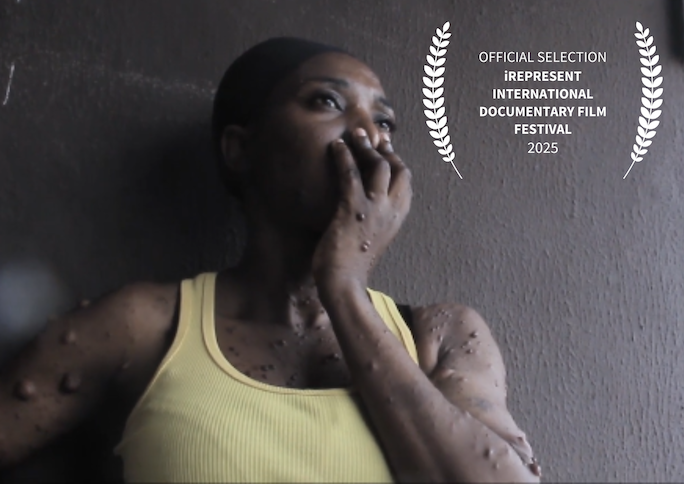
Creating a documentary like Born Different, about Grace Okhime who lived with neurofibromatosis, demands a deep level of emotional investment. What compelled you to tell her story?
Oh, yes, I felt strangely compelled to tell her story in 2020 when she shared her struggles with landing a decent employment because of her body. She was walked out of most interviews and never given a chance to express her qualifications for the roles. I first read about her on Instablog9ja, and something in me knew I had to find her. I searched for her on Facebook, reached out, and from the moment we connected, I was drawn to her resilience.
I also understood, in a way, why people were hesitant to associate with her. It’s human nature to react to what we don’t understand. Seeing someone with tumors covering their skin can be unsettling at first, often because of ignorance rather than malice. But beyond that, she was a person — brilliant, kind, and full of life. I knew this documentary had to be more than just a film. It had to be an extension of herself; a way to make her voice permanent. Before anything, I extended a hand in friendship. I genuinely cared for her, and I think she felt that sincerity. That trust allowed her to open up and share her truth with me and, by extension, the world.
Sadly, a few months after we released the documentary, she was diagnosed with cancer and passed away in 2024. Grace Ohkime was such a force to be reckoned with, and while I miss her greatly, I’m glad she shared her story before bidding goodbye to the world. The impact of her courage continues, and I’m honored to have played a part in sharing her voice.
You are one of the few women making horror films in Nigeria. What drew you to the genre?
There wasn’t a specific incident that sparked my interest in horror films. It’s more about my deep affinity with the unknown and the metaphysical. Also, I grew up listening to my mother’s scary moonlight tales about Madam Koi-Koi, Bush Baby, the little girl who picked money on the street and turned to yam, money rituals, and many more. The chills felt weirdly satisfying. Overtime, these elements influenced my works. I’m always drawn to the unseen forces that guide humanity. But beyond just scaring audiences, I believe horror films have a unique ability to explore human complexities in a way no other genre does. We all carry a darkness within us, and horror allows us to confront it, whether we acknowledge it or not.
You run the Africa International Horror Film Festival. How did you start it? How has the experience been for you and your team? How do you see it evolving, both in promoting African horror cinema and as a platform for emerging filmmakers?
The Africa International Horror Film Festival started as a passion project. It felt like the horror genre was dying off, and what better way to revive it than by setting up a platform that celebrates and promotes it? Interestingly, the festival is the first horror film festival in West Africa and second in Africa.
When I first started, people were skeptical about the growth; they even doubted that Africans made horror films. Thankfully, I wasn’t alone. A few colleagues believed in the vision and came onboard to support the project. Dhee Sylvester took charge of setting up all the brand assets, while Juliet Ezeigwe contributed as a programmer. Our first year was entirely self-funded, but we were fortunate to receive crucial partnerships, particularly from Freedom Park, Lagos. By our second and third editions, we had secured RED TV, under United Bank for Africa (UBA), as our major sponsor.
One of the most fulfilling moments has been meeting winning filmmakers who express how much the AIHFF means to them. Many tell us they finally feel seen, and that’s what makes it all worthwhile.
Looking ahead, we want to go beyond just screening and promoting horror films. Our long-term vision includes organizing film residencies and establishing a film market to help grow the genre further. It’s a gradual journey, but we’re committed to making it happen. We are currently restructuring to accommodate a larger vision. Our next edition will be held in 2026 — bigger and better.
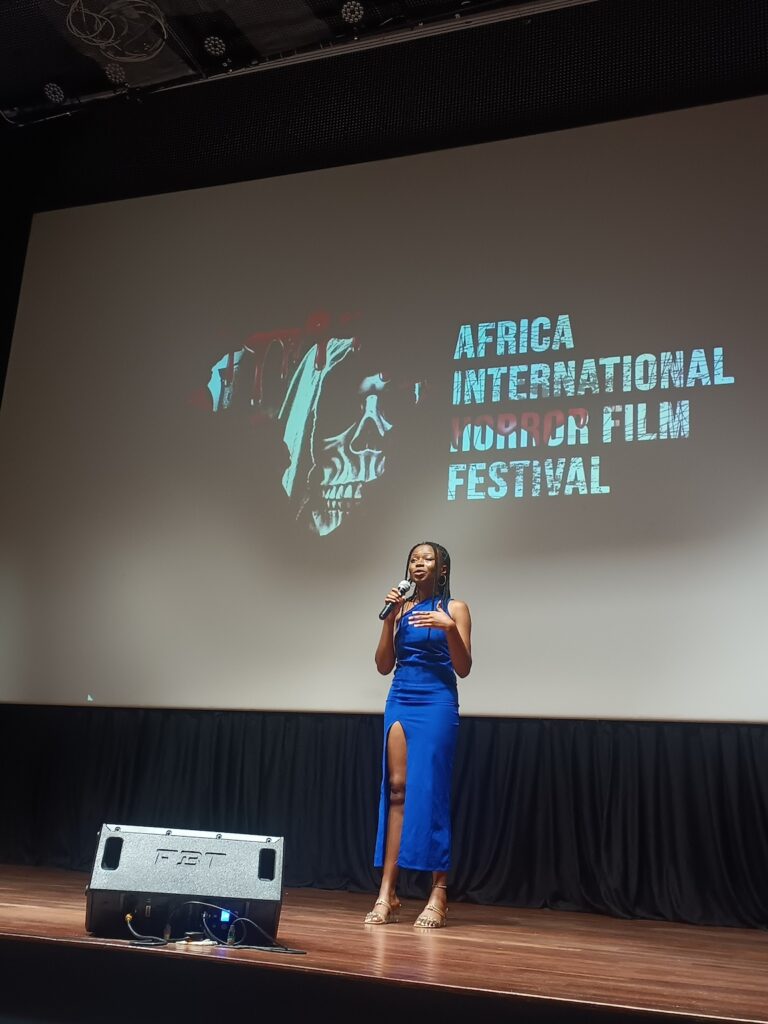
Sometime ago, we published a list of book adaptation recommendations because many Nollywood productions still lack story depth. There’s an obvious solution — invest in professional writers. But very few producers are willing to incur the financial implications of this. For many writers, it’s a matter of nepotism. How can producers and directors balance the need to give opportunities to new and emerging talent with the importance of working with experienced storytellers who can bring depth and complexity to their films?
I think “trends” contributes to the lack of story depth we have today. It’s like there’s an industry formula for successful films, and most filmmakers stick to it because they don’t want to take financial risks. This is understandable, though, considering that most people see film as a “product,” and create what they think people will buy. It’s not just a Nollywood issue; it happens in studio systems worldwide.
I think Nollywood has grown massively in terms of production value. It’s hard to ignore that, and kudos to all the pioneers pushing the boundaries. However, when I started this artistic journey, I vowed not to be limited by my location. Yes, I’m a Nigerian living in Nigeria, but before that tag, I’m human. I’m African. Strip the identity tag we’ve given ourselves as a society and you’ll see that we are just people, sharing the same emotions, struggles, and complexities. That’s why a film made in Nigeria can resonate with someone in Asia.
That said, audiences are craving fresh perspectives, which is why indie films are gaining more traction. Depth and complexity in a film can only be achieved when the creator lets go of all inhibitions and studio rules and comes up with something raw and genuine. So I think Nollywood producers should step out of the box a little bit, give themselves chances to explore other film genres beyond comedy and rom-coms. Instead of asking, “What story sells now?” they should ask, “What story matters?” We should see beyond our labels, go deep within ourselves, and tell human stories that connect on a universal level. That’s my approach.
Rita Dominic has spoken out about the lack of trust in women’s abilities behind the scenes — in directing, producing, videography, photography, etc. Have you, as a filmmaker, witnessed or experienced any of these challenges firsthand? If so, how did you navigate them?
No, I haven’t experienced such challenges, perhaps because I don’t pay attention to gender when I’m on a film set. That said, while working with the camera crew, I’ve had male colleagues try to stop me from lifting heavy gear, to prevent me from getting hurt. I would appreciate their concern, but over time, when they see that I keep moving things around to keep the production going, they get used to it. Generally, I focus more on my work than gender dynamics. My gender doesn’t shape how I approach storytelling or filmmaking. I simply follow where my soul leads. ♦
If you enjoyed what you just read, consider making a PayPal donation to enable us to publish more like it.
More In-depth Stories on Nollywood from Open Country Mag
— The Best Films, TV, and Performances of the Year: 2023, 2024
— Rita Dominic‘s Visions of Character
— The Epic, Transformative Comeback of Chidi Mokeme
— In Dika Ofoma‘s Short Films, the Drama Is in the Mundane
— Fatima Binta Gimsay Got Her Start by Asking. Now She Runs Her Own Shows.
— How Dakore Egbuson and Tony Okungbowa Traverse Trauma in YE!
— With the S16 Film Festival, an Arthouse Collective Locks Its Focus
— How Tolu Obanro, Nollywood’s Top Composer, Crafts the Sounds of Its Biggest Hits
— A Small Indie Producer Bets on Social Justice Cinema
— A Tribe Called Judah, Reviewed: A Box Office-Breaking Heist of Authenticity & Heart
— How Mami Wata Swam to Sundance
— Writing Omo Ghetto: The Saga, Nollywood’s Highest Grossing Film of All-Time
— How Yahoo+ Captured a Desperate Side of Internet Fraud
— Awaiting Trial: Families of SARS Victims Speak in Devastating Documentary
— Country Love Depicts Tenderness in LGBTQ Lives

